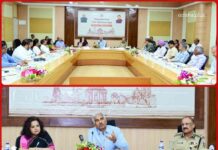Kasturi Ray
Excerpted from ‘Droupadi Murmu – From Tribal Hinterland to Raisina Hill’ by Katuri Ray with permission from publishers Rupa Publications, New Delhi
Apart from education, health indicators of tribals were also a priority for Murmu. She insisted on the state and central governments working in tandem to give the marginalized their due at least through health welfare schemes. Education is important, and once a tribal person gets educated, he or she will take care of their health concerns as well.

She has been vocal about many other issues concerning the tribal people. She wanted them to be allowed to collect minor forest produce and store it, as against the current limit of storing only 5 kg mahua. She was also openly against outsiders interfering in purchasing minor forest produce from the tribals.
According to her, other than the government, no one should interfere in this, as it is the only source of income for tribal people. She expressed concern about the changing governments in the state that had affected its development. There have been as many as ten governments in two decades of Jharkhand’s existence.

But she was always positive about changing the lives of the tribals. In Jharkhand, her doors were always open to people. She would hear as many of them as possible and then take up their issues with the government.
The Charan Paduka Yojana introduced in Jharkhand got Murmu’s support as well. Footwear was provided to members of the poorest and most marginalized tribal groups in the state for free as part of the scheme. About 100,000 tribals benefitted under the scheme, launched by CM Raghubar Das, in its first phase.
Once, while speaking at Sekkor Premium League organized by Tata Steel’s ore, mines and quarries division at Noamundi Sports Stadium in West Singhbhum district in Jharkhand, Murmu emphasized how everyone, including the mining sector, needs to work towards educating tribals.
She expressed her concern that they were often taken for granted and cheated in the process because they were uneducated and gullible. Not all of them would get a government job, but education could at least open their eyes to what was good and bad. So, everyone must take steps for their empowerment.
She appreciated Tata Steel for their tribal-friendly programmes in terms of providing livelihood, education and awareness about saving the girl child and simultaneously promoting tribal culture through their corporate social responsibility activities. Murmu expressed her happiness at tribal sports being preserved and not becoming extinct. ‘Traditional tribal sports like Kati, Sekkor, Chhur, Bahu Chor and Ramdel played by the Santal and Ho communities of Jharkhand are on the path of revival and that is so heartening,’ she said at the event.
Her Jharkhand term, however, never overshadowed her concerns for her native place and constituency. Amid her responsibilities at Ranchi, she kept track of the well-being of the people back home with equal zeal and wanted to ensure the development of the villages in her home district.
Ishwar Chandra Mishra and Shyam Charan were colleagues at the Bank of India but posted in different branches. Mishra, as a bank officer, was reformative by principle, which earned him a lot of goodwill among people. Murmu, too, was impressed by him and wanted him to grant loans to villagers and launch digital banking schemes in remote villages.
He obliged. ‘Our purpose was that banking facilities should be available to all. So I was not doing anything great, I was just ensuring that villages like Uparbeda, which were untouched by banking facilities, get all banking help as early as possible. And Madam Governor’s instructions were good enough to be carried forward,’ Mishra remembered.
In 2017, after Mishra was transferred to Keonjhar zone, which had thirteen Odisha districts under its fold, Murmu called him and expressed her concern about uplifting Uparbeda and other smaller villages nearby. She wanted the people there to lead a hassle-free life where they could get money to start a business or invest in vocational training or agriculture at lower rates of interest so that they can pay back the principal amount.
‘Please help them with banking facilities and provide loans to the needy so that they can do something better to earn a livelihood,’ she asked Mishra. As Mayurbhanj was under the Keonjhar banking jurisdiction, Mishra quickly agreed to do whatever was required. This was around the time when Bank of India was getting into the digitization of villages in a big way.
Mishra stated: I immediately instructed my team to start work in Uparbeda village. We did extensive data collection and, to the entire literate population, we provided provisions of opening bank accounts, getting debit cards and sanctioning loans to those who wished to invest in any livelihood option. We also set up training camps for women to learn stitching and granted them loans to buy a sewing machine that could help them earn.
Mishra added that the loan facilitation was done on a differential rate of interest of 4 per cent only. ‘Loans were provided to even those who wished to take up mushroom cultivation,’ Mishra says.


















